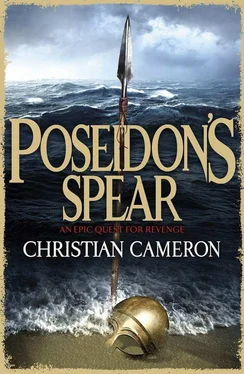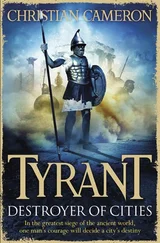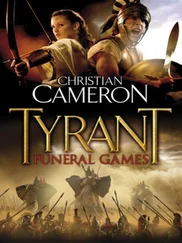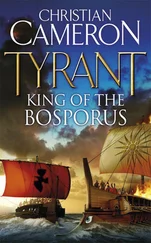Christian Cameron - Poseidon's Spear
Здесь есть возможность читать онлайн «Christian Cameron - Poseidon's Spear» весь текст электронной книги совершенно бесплатно (целиком полную версию без сокращений). В некоторых случаях можно слушать аудио, скачать через торрент в формате fb2 и присутствует краткое содержание. Жанр: Исторические приключения, на английском языке. Описание произведения, (предисловие) а так же отзывы посетителей доступны на портале библиотеки ЛибКат.
- Название:Poseidon's Spear
- Автор:
- Жанр:
- Год:неизвестен
- ISBN:нет данных
- Рейтинг книги:5 / 5. Голосов: 1
-
Избранное:Добавить в избранное
- Отзывы:
-
Ваша оценка:
- 100
- 1
- 2
- 3
- 4
- 5
Poseidon's Spear: краткое содержание, описание и аннотация
Предлагаем к чтению аннотацию, описание, краткое содержание или предисловие (зависит от того, что написал сам автор книги «Poseidon's Spear»). Если вы не нашли необходимую информацию о книге — напишите в комментариях, мы постараемся отыскать её.
Poseidon's Spear — читать онлайн бесплатно полную книгу (весь текст) целиком
Ниже представлен текст книги, разбитый по страницам. Система сохранения места последней прочитанной страницы, позволяет с удобством читать онлайн бесплатно книгу «Poseidon's Spear», без необходимости каждый раз заново искать на чём Вы остановились. Поставьте закладку, и сможете в любой момент перейти на страницу, на которой закончили чтение.
Интервал:
Закладка:
Christian Cameron
Poseidon's Spear
Prologue
So — here we are again.
Last night, I told you of Marathon — truly the greatest of days for a warrior, the day that every man who was present, great or small, remembers as his finest. But even Marathon — the great victory of Athens and Plataea against the might of Persia — did not end the Long War.
In fact, thugater, an honest man might say that the Battle of Marathon started the Long War. Until Marathon, there was the failed revolt of the Ionians, and any sane man would have said they had lost. That the Greeks had lost. In far-off Sardis — in Persepolis, capital of the Persian Empire — they barely knew that Athens existed, or Sparta, and I will wager not a one of the gold-wearing bastards had heard of Plataea.
I was born in Plataea, of course, and my father raised me to be a smith — but my tutor Calchus saw the man of blood inside me, and made me a warrior, as well. And even that isn’t really fair — my pater was a fine warrior, the polemarch of our city, and he led us out to war with Sparta and Corinth in the week of three battles, and fought like a lion, and died — murdered, stabbed in the back while he fought, by his own cousin Simon, and may the vultures tear his liver in eternal torment!
Simon sold me as a slave. I had fallen wounded across my pater’s corpse, and Simon took me from the battlefield and sold me. Why didn’t he kill me? It might have helped him, but often, evil men beget their own destruction with their own acts — that is how the gods behave in the world of men.
I grew to full manhood as a slave in Ionia, the slave of Hipponax and his son Archilogos, and to be honest, I loved them, and seldom resented being a slave. But Archilogos had a sister, Briseis, and she is Helen reborn, so that even at thirteen and fourteen, men competed for her favours — grown men.
I loved her, and still do.
Not that that love brought me much joy.
And I received the education of an aristocrat, by attending lessons with my young master — so that I was taught the wisdom of Heraclitus, whom many worship as a god to this very day.
When I was seventeen or so, events shattered our household — betrayal, adultery and civil war. I’ve already told that story. But in the end, the Ionians — all the Greeks of Asia and the Islands — left the allegiance of Persia and went to war. In my own house, I was freed, and became Archilogos’s friend and war-companion. But in my hubris I lay with Briseis, and was banned from the house and sent to wander the world.
A world suddenly at war.
I marched and fought through the first campaign, from the victory at Sardis to black defeat on the plains by Ephesus, the city of my slavery, and then I fled with the Athenians. I served as a mercenary on Crete, and found myself with my own black ship at Amathus, the first naval battle in the Ionian Revolt. We won at sea. But we lost on land, and again, I was on the run in a captured ship with a bad crew.
Eventually, I found a new home with the Athenian lord, Miltiades. As a pirate. Let’s not mince words, friends! We killed men and took their ships, and that made us pirates, whatever we may now claim.
But Miltiades was instrumental in keeping the Ionian Revolt alive, as I’ve told on other nights. We fought and fought, and eventually we drove the Medes from the parts of the Xhersonese they’d seized, and used it as a base to wreck them — until they sent armies to clear us from the peninsula.
I did as Miltiades bade me: killed, stole, and my name gained renown.
After a year of fighting, we were losing. But we caught a Persian squadron far from its base, in Thrace, and we destroyed them — and in the fighting, I murdered Briseis’ useless husband. Again, I’ve told this story already — ask someone who was here.
I thought that, now Briseis was free to marry me, she would.
I was wrong. She went back east to marry someone older, wiser and more powerful.
So I went back to Plataea.
I worked my father’s farm, and tried to be a bronze-smith.
But a man died at the shrine on the hill — and his death sent me to Athens, and before long I was back at sea, killing men and taking their goods. Hard to explain in a sentence or two, my daughter. But that’s what I did. And so, I was back to fighting the Persians. I served Miltiades — I ran cargoes into Miletus, the greatest city of Ionia, besieged by the Persians, and we saved them. And then the East Greeks formed a mighty fleet, and we went to save Miletus.
And we failed.
We fought the battle of Lade, and the Samians betrayed us, and most of my friends died. Miletus fell, and in the wake of that defeat, Ionia was conquered and the East Greeks ceased to be free men. The men of some islands were all killed, and the women sold into slavery.
It’s odd, thugater, because I loved the Persians, their truth-telling and their brilliant society. They were good men, and honourable, and yet war brought the worst of them to the fore and they behaved like animals — like men inevitably do, in war.
They raped Ionia and Aetolia, and we — the survivors — scuttled into exile. I ran home, after Briseis spurned me again.
So I went back to the smithy in Plataea. I began, in fact, to learn to be a fine smith.
But I had famous friends and a famous name. I had occasion to save Miltiades of Athens from a treason charge — heh, I’ll tell that story again for an obol — and as a consequence, my sister got me a beautiful wife. Listen, do you doubt me? She was beautiful, and had I not saved Miltiades…
At any rate, I married Euphoria.
And a summer later, when she was full of my seed, I led the Plataean phalanx over the mountains to Attica, to help save Athens. This time, when the Persians forced us to battle, we had no traitors in our ranks and we were not found wanting. This time, the gods stood by us. This time Apollo and Zeus and Ares and Athena lent us aid, and we beat the Persians at Marathon.
But I told that story last night.
And when I came home, my beautiful Euphoria was dead in childbirth. Her newborn child — I never saw it — lay in swaddling with a slave. I assumed it dead. My sister still blames herself for that error, but I have never blamed her. Yet, to understand my tale, you must understand — I thought my child had died…
So I picked my beloved wife up, took her to my farm and burned it, and her, with every piece of jewellery and every scrap of cloth she’d ever worn or woven.
And then I took a horse and rode away.
That ought to have been the end. But it was, of course, another beginning, because that’s how the gods make men.
You need to understand this. After Marathon, nothing was the same. No one was the same. Life did not taste sweet. Indeed, most of us felt that our greatest deed, and days, were behind us, and there was not much left for us to do. And I had lost wife and child. I had nothing to live for, and no life to which to return.
Part I
I see a Greek ship on the beach, and sailors who ply the oar coming to this cave with one who must be their commander. About their necks they carry empty vessels, since it is food they need, and pails for water. O unlucky strangers! [90] Who can they be? They know not what our master Polyphemus is like, nor that this ground they stand on is no friend to guests, and that they have arrived with wretched bad luck at the man-eating jaws of the Cyclops. But hold your peace so that we may learn [95] where they have come from to Sicilian Aetna’s crag.
Euripides Cyclops 851
I was off my head.
I rode south past the shrine in a thunder of hooves, so that Idomeneus came out with a spear in his hand. But I did not want his blood-mad comfort. I rode past him, up the mountain.
Читать дальшеИнтервал:
Закладка:
Похожие книги на «Poseidon's Spear»
Представляем Вашему вниманию похожие книги на «Poseidon's Spear» списком для выбора. Мы отобрали схожую по названию и смыслу литературу в надежде предоставить читателям больше вариантов отыскать новые, интересные, ещё непрочитанные произведения.
Обсуждение, отзывы о книге «Poseidon's Spear» и просто собственные мнения читателей. Оставьте ваши комментарии, напишите, что Вы думаете о произведении, его смысле или главных героях. Укажите что конкретно понравилось, а что нет, и почему Вы так считаете.












